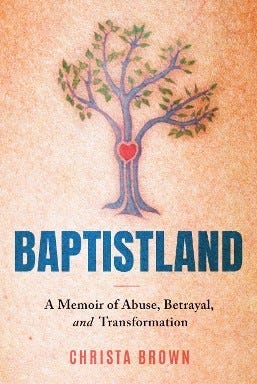Within evangelicalism, the rampant clergy sex abuse persists not solely because of the obviously wicked but because of countless complicit others who turn a blind eye, who allow abuse and coverups to proliferate, and who perpetuate a system of clergy impunity.
In other words… it’s the Good Guys, too. Or at least people who get labeled as Good Guys.
And when we overlook that – when we focus only on the Bad Guys – we fail to see the reality of the larger systemic problem.
This is something I’ve written about before, and it’s something worth remembering in the lead-up to the Southern Baptist Convention’s big annual brouhaha in June – an event that, almost certainly, will yield no meaningful progress on abuse reform measures to make kids and congregants safer.
And while many might like to believe that the SBC’s continuing failure is because of a few Bad Guys who block reforms, the reality of unrelenting systemic institutional horror is more complicated and more pervasive. And yes… Good Guys are a part of it.
That’s why I sat pumping my fist when I saw a recent Facebook post by Heather Griffin. Heather’s post was prompted by this case involving a Pentecostal evangelical preacher, but the patterns are much the same within the Southern Baptist Convention – patterns of religious leaders who ignore warnings, who fail to intervene, and who protect their cronies.
With Heather’s permission, here’s some of what she wrote:
“Most pastors who hear about allegations of sexual abuse against another pastor are going to empathize with the pastor and not with the alleged victim.
I didn't want to believe this, but I've seen it over...and over...and over.
It's not just the wicked leaders who also have something that they need to cover up, though that happens much more frequently than people want to think. It's the Good Guys….
Nobody wants to believe that someone they like or someone who seems like them would violate a vulnerable people who are in their care – especially not children.
Many men in church leadership say things like "I consider myself a very good judge of character." If they have to face even the possibility that someone who seems like them is a sexual predator, they have to face how little discernment they actually have after decades of following the Lord and priding themselves on being people who Take Sin Seriously.
Many people will sacrifice children to their idols and call their idols "Jesus" readily enough in this situation.
The people bringing the allegations have to be bad so the cherished predator (who has groomed leaders and the community as well as direct victims) can be seen as good.
The victims who risk trusting that maybe this leader will do the right thing have to be "tools of Satan" or "Jezebels" so that Christian men and women who Consider Themselves Very Good Judges of Character don't have to face the magnitude of evil and sin in the world that they supposedly believe Jesus can save them from.
People are against abuse when it is an abstraction. In real situations, the same people are more likely than not to decide that this situation is a false accusation, or an exaggeration, or a misunderstanding.
No one thinks that they would mishandle real abuse allegations because they tacitly assume two things: 1) Only very bad, insincere people respond to Legitimate Abuse Allegations poorly; and 2) God would surely illuminate their judgment if an abuse allegation were legitimate.
These assumptions make it less likely that people will bother to learn about abuse, how predators groom communities, and how to respond to allegations in ways that do not further devastate victims who have already been betrayed by someone representing the name of Jesus.
Plan ahead. Get training. Expect that you will not want to believe. Expect that you will be willing to think badly of anyone bringing a sexual assault allegation before you will consider that you may have been taken in by a predator who devoured the sheep on your watch.
Train your leaders…to resist this, otherwise they will join in the scapegoating and the re-sacrifice of the victim.
Your sincerity and good intentions will not save you from making mistakes that destroy peoples' hope that church can be a place of truth, healing, and justice.”
In the Southern Baptist Convention, not only are they still refusing to keep records on credibly accused clergy sex abusers, but even their minimal and inadequate training programs are entirely voluntary and ignored by many.
So, a whole lot of church leaders make the very assumptions that Heather talks about – the assumptions that lead to so much harm.
And so, the patterns repeat and repeat and repeat.
For more on the abuse and coverup patterns in the Southern Baptist Convention, check out my book, Baptistland: A Memoir of Abuse, Betrayal, and Transformation. It’s currently on sale!






For sure. I wonder if that's the Heather G I knew from Twitter.